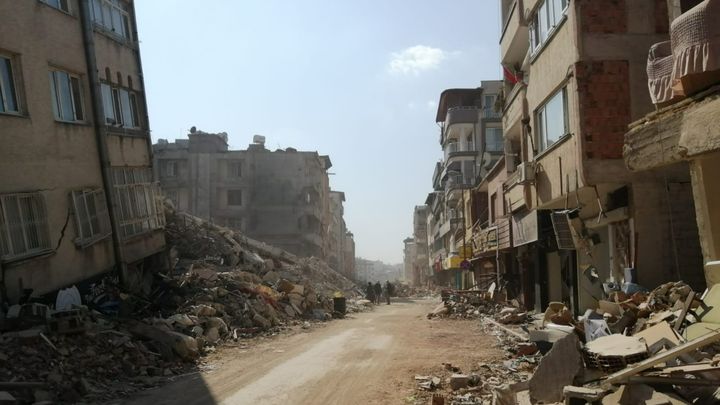Update 2/15/2023
Thank you all for your generous support. We are reaching $180 K in donations - more than what we initially planned.
We closely follow the developments in Turkey that can affect how the funds are allocated and dispersed. As promised in our initial message, we commit to the safe transfer of our funds reaching the most vulnerable on the ground. Research Institute on Turkey is an active and well-connected member of civil society in Turkey. We will utilize this advantage to pin down the trusted and vetted organizations that actively work in the affected areas. We will not transfer any funds to any organizations until we can guarantee that there will be no interruptions or diversions of the funds.
We are also grateful that a large funding pool is created by various organizations in the US and there is a steady flow of funds to Turkey. We believe that this will be a long haul and we will do our best to make use of our humble contribution to the relief efforts.
We will continue to share updates as new developments emerge.
Thank you for helping us diversify our resources for the most vulnerable on the ground.
Research Institute on Turkey
2/6/2023
On February 6, 2023, at 04:17, Turkey woke up to a dark day. One of the deadliest in the history of the country, two earthquakes of magnitudes 7.8 and 7.5 hit central Turkey and Syria, affecting nearby countries and many cities where some 15 million people live.
The toll of the earthquake, which heavily affected the region where it occurred, especially Hatay, Maraş, Antep, Diyarbakır, Malatya, Osmaniye, Adana, Adıyaman and Urfa, is in the order of thousands and still rising.
Snowy winter exacerbates the humanitarian disaster, as many affected regions are yet unattended by rescue teams. Turkey declared a Level-4 emergency alert that includes a general call for international support. According to the initial reports from the region, many people either lost their lives or are still under the rubble, and thousands were left homeless in cold weather conditions or cannot enter their homes. Despite the incremental weather, search and rescue teams continue their work in the region. Concern grows deeper that the weight of the destruction is more serious than we can currently see.
From the very first moment of the earthquake, many local aid and support organizations have been mobilized and are trying to reach and provide aid to the earthquake victims as conditions allow. There is an urgent need for immediate actions and resources such as food, winter clothing and shelter support.
Research Institute on Turkey calls for the international community to provide immediate support for recovery efforts by raising funds that will be transparently transferred to Ahbap Derneği as well as other active and respected non-governmental organizations in Turkey, which are working in the affected region, mobilize local and international support. Donation updates will be frequently shared on the campaign page.
Your urgent support and assistance to earthquake victims are very important and vital.
Every penny counts and all donations will support the recovery efforts. As needs emerge, we will support local and vetted partner organizations in the region. Please help us spread the word.
- Please note all additional tipping during the donation is voluntary and will not be added to the donation to RIT.
- Please ask your employer to match your donation.
Organizer:
Research Institute on Turkey (RIT)
Research Institute on Turkey, Inc. is a registered 501(c)3 non-profit organization in New York State, USA. EIN: 81-4004031
Supporting Organization:
Turkey Human Rights Litigation Support Project
Supporting Academics & Researchers:
Canan Dağdeviren, Massachusetts Institute of Technology (MIT), USA
Eylem Delikanli, Research Institute on Turkey, USA
Çağhan Kızıl, Columbia University, USA
Aylin Tekiner, Research Institute on Turkey, USA
Ayşe Bingöl Demir, Turkey Litigation Support Project, UK
Yektan Türkyılmaz, Central European University, Austria
Gülce Nazlı Dikeçligil, University of Pennsylvania, USA
Esra Akcan, Cornell University, USA
Onur Günay, Princeton University, USA
Işın Önol, University of Applied Arts, Austria
Lara Fresko, Bard College, USA
Civan Özkanoğlu, Artist, USA
Semir Beyaz, Cold Spring Harbor Laboratory, USA
Bruce Alberts, University of California, San Francisco (UCSF) and National Academy of Sciences (NAS), USA
Richard Mayeux, Columbia University Irving Medical Center (CUIMC) and National Academy of Medicine (NAM), USA
Nancy Green, Columbia University Irving Medical Center (CUIMC), USA
Dani Rodrik, Harvard University, USA
Can Erbil, Boston College, USA
Tolga Can, Colorado School of Mines, USA
Tolga Özmen, Massachusetts General Hospital, USA
Aslı Arda, University of Copenhagen, Denmark
Derya Sargın, University of Calgary, Canada
Tobias Noebauer, The Rockefeller University, USA
Ayça Çubukçu, London School of Economics, UK
Marianne Hirsch, Columbia University, USA
Leo Spitzer, Dartmouth College, USA
Arnold Aronson, Columbia University, USA
Diana Taylor, New York University, USA
Lorie Novak, New York University, USA
Ali Yaycıoğlu, Stanford University, USA
Ayça Alemdaroğlu, Stanford University, USA
Selçuk Şirin, New York University (NYU), USA
Mete Atatüre, University of Cambridge, UK
Ayten Gündoğdu, Barnard College, USA
Lydia Lynch, Harvard Medical School, USA
Özge Samancı, Northwestern University, USA
Maria Jose, Columbia University, USA
Işınsu Baylam Toker, California Polytechnic State University and OPTICA, USA
Maggie Boyraz, California State University San Bernardino, USA
Bilge Yıldız, Massachusetts Institute of Technology (MIT), USA
Philip Leach, Middlesex University, UK
Helen Duffy, Leiden University, Netherlands

 Verified
Verified